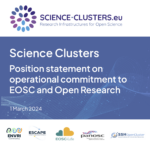What future for PaN Data? A LEAPS and LENS perspective
The outcomes and future of the two EOSC projects PaNOSC and ExPaNDS were presented at the LEAPS General Assembly on 17 September 2021 and the LEAPS plenary meeting on 20-21 October 2021. The two projects include almost all members of LEAPS and LENS, and therefore the adoption and sustainability of the services developed in PaNOSC and ExPANDS depend on the LEAPS and LENS facilities.
Following the meeting, and the distribution of a questionnaire to LEAPS and LENS members concerning the adoption of the outcomes and the future PaN data strategy, a large majority confirmed that they would indeed adopt most of PaNOSC and ExPaNDS outcomes in the future (the survey results can be consulted in the table below), with half of the facilities having already adopted some of the tools developed in PaNOSC and ExPaNDS, or being in the process of adopting them. In particular, the tools which have been considered more useful or urgent to implement are the FAIR data policy, Data Management Plans, Nexus HDF5 as common data format, DOIs, and the Open Data portal. One question is still open: how will all open data from PaN facilities be searchable and accessible from a common portal.
Such a PaN Open Data Portal, which would allow search for data across all facilities, would greatly enhance the visibility and impact of PaN data. It would make it easier to find and access data (F and A of FAIR) and make them more re-useable (R of FAIR), thus contributing to implementing a Data Commons for Open Science across PaN facilities.
Twelve of the sixteen facilities responding to the questionnaire declared to share the view of a PaN Data Commons, with only four of them being against.
Finally, to the question on whether there is the need for a common Open Science and Open Data strategy paper for LEAPS, most respondents (9) confirmed so, and only one denied it, whereas six facilities wouldn’t have an answer to the question yet.
Such results are based on the assumption that on-going efforts are completed by the end of the projects.
To this aim, the PaNOSC and ExPaNDS communities need to keep collaborating in the future on issues around data management, with the goal of making FAIR data a reality by enabling open science through a PaN Data Commons, to which both LEAPS and LENS should commit after the end of the PaNOSC and ExPaNDS projects.


